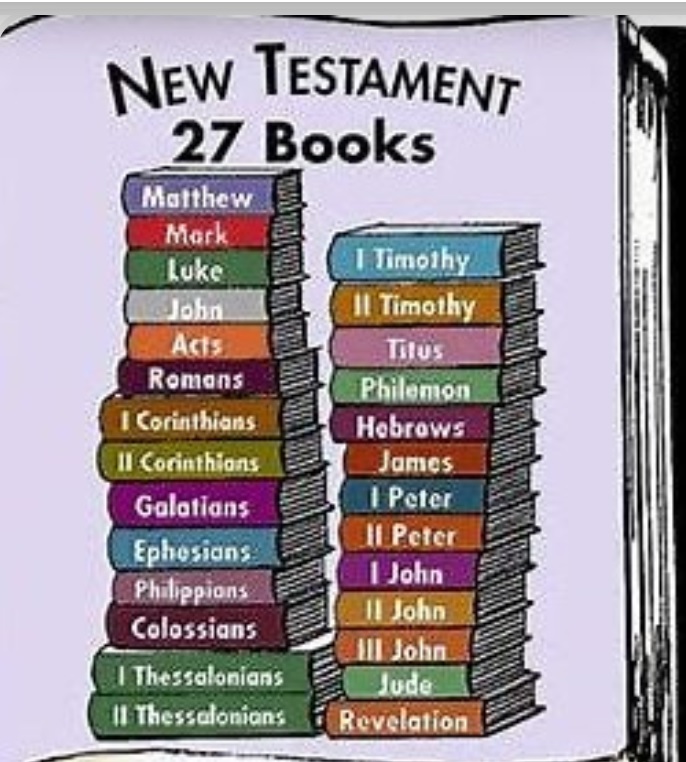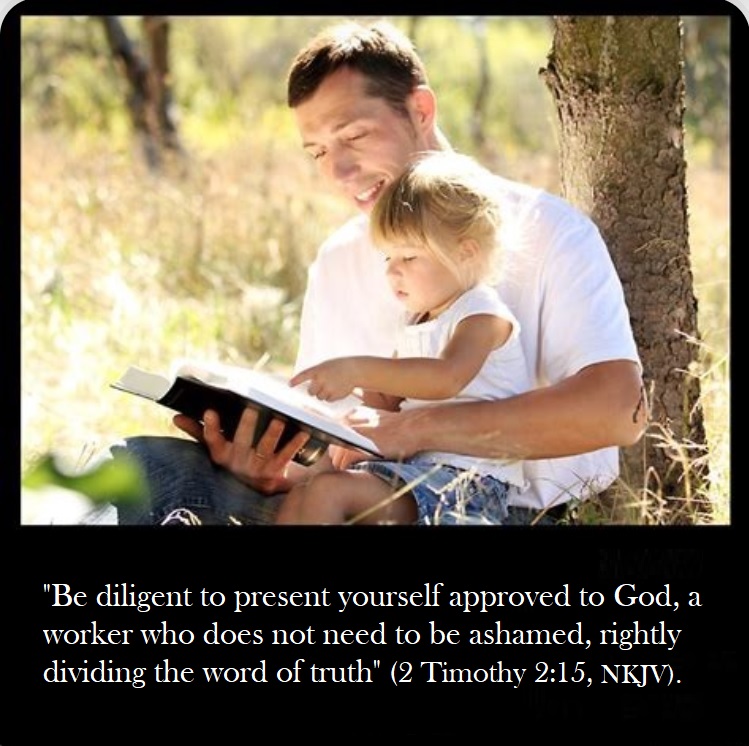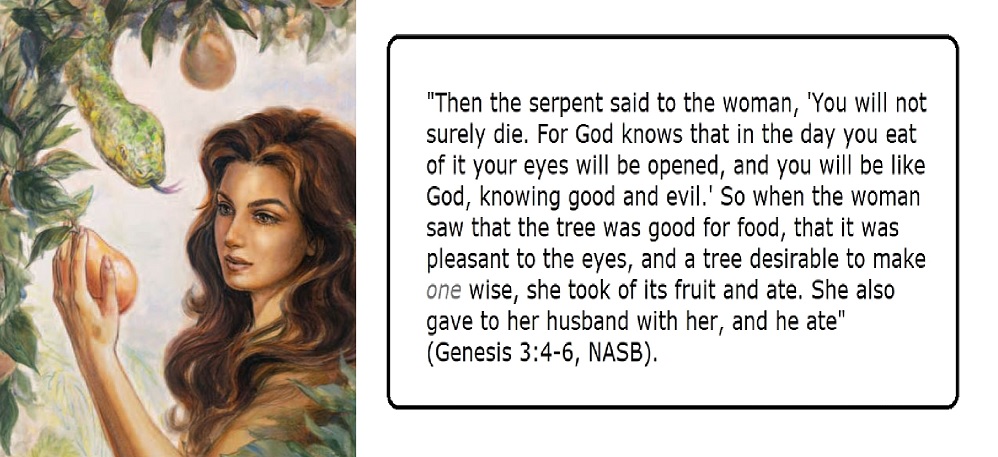“Go therefore and make disciples of all the nations…teaching them to observe all that I commanded you; and lo, I am with you always, even to the end of the age” (Matthew 28:19-20, NASB).
——————–
Contents:
1) Transformation (Frank Himmel)
2) Miracles: The Power of Satan or the Finger of God (Clarence R. Johnson)
3) Biblical Correctness (Rob Harbison)
4) News & Notes
——————–

-1-
Transformation
Frank Himmel
“For whom He foreknew, He also predestined to become conformed to the image of His Son, so that He would be the firstborn among many brethren” (Romans 8:29).
“And do not be conformed to the world, but be transformed by the renewing of your mind, so that you may prove what the will of God is, that which is good and acceptable and perfect” (Romans 12:2).
These two verses from the same letter present an unmistakable contrast: conformity to Christ vs. conformity to the world. Paul’s word translated world literally means an age; it therefore emphasizes prevailing thought.
Dismissing worldly thinking and becoming like Christ is a challenging transformation. The world constantly preaches to us through education, entertainment, news/commentary (there is often little distinction between those two these days!), advertising, and social media, as well as just ordinary conversation. That’s a lot of input! We have to work hard at countering all that by listening to the truth of God’s word. From a time perspective, three or four hours a week at church pales in comparison, and some don’t even get that much. Daily Bible reading is a must!
This transformation applies to every area of life. It applies first of all to our view of Jesus. A balanced biblical view of Him is much different than the world’s skewed view. It applies to the church. Worldly standards or expectations for churches are irrelevant. What is God’s will? It applies to morals and ethics. Worldly thinking here is sometimes exactly opposite God’s: “Woe to those who call good evil and evil good; who substitute darkness for light and light for darkness; who substitute bitter for sweet and sweet for bitter!” (Isaiah 5:20). It applies in every relationship: family, work, community, etc. It governs our thinking, our speech, our actions, and our reactions.
Notice that Paul calls on us to prove what God’s will is. The world may be content to merely assert based on scant evidence or even in defiance of the obvious, but Christians must never do that. Don’t just say, “I know God would [would not] want me to . . .”; turn in your Bible and read what He said about it. The gospel’s mission is to destroy speculation and take every thought obedient to Christ (2 Corinthians 10:5). Paul wrote of inspired teaching, “Do not despise prophetic utterances. But examine everything carefully; hold fast to that which is good; abstain from every form of evil” (1 Thessalonians 5:20-22).
Becoming a Christian is an act of conformity to Christ as we are buried with Him in baptism, a likeness of His death, burial, and resurrection for us (Romans 6:1ff). The conformity of Romans 12:2 is an ongoing process. Let’s give it our best effort.
— Via Pathlights, October 18, 2020
——————–

-2-
Miracles: The Power of Satan or the Finger of God?
Clarence R. Johnson
In Matthew 9:32-34, Matthew records, “As they went out, behold, they brought to Him a man, mute and demon-possessed. And when the demon was cast out, the mute spoke. And the multitudes marveled, saying, ‘It was never seen like this in Israel!’ But the Pharisees said, ‘He casts out demons by the ruler of the demons.’”
Glancing back over the last few chapters, Matthew has told us of the cleansing of a leper, the healing of the paralyzed servant of a Roman centurion, the healing of Peter’s mother-in-law who was sick with a high fever, the calming of a storm at sea, the freeing of two demon-possessed men who had been extremely wild and dangerous before Jesus freed them from demon-possession, the raising of a girl from the dead, the healing of the woman who had had a flow of blood for 12 years, the healing of two blind men, and numerous others who came to Him — and now this freeing of the mute who had been demon-possessed. No wonder the multitudes marveled “It was never seen like this in Israel!”
But even in the light of Jesus’ marvelous accomplishments, He always had His detractors. “The Pharisees said, ‘He casts out demons by the ruler of the demons.’”
Luke 11:14-23 shows that still others came, asking for a sign from heaven. Indeed, after all the miracles He had worked in the immediate setting, what else could He have done to prove He came from heaven?
In fact, as He defended Himself against the charge of using Satanic powers He reasoned that Satan certainly would not cast out demons. To do so would be to work against himself. Not only that, but the sons of the Pharisees — perhaps a reference to their disciples — also cast out demons, or at least claimed to do so. By whose power did they seek to overcome Satan? The only logical conclusion — the necessary inference — was that Jesus was operating by the power of God, and the logical application of that realization was that the very reign of God Himself was evident in Jesus’ ministry: “If I cast out demons with the finger of God, surely the kingdom of God has come upon you” (Luke 11:20).
Finally, Jesus further illustrates this principle with a parable. The only one who can throw a strong man out of his palace is an even stronger man than the first. Likewise, the only one who could cast demons out of their dwelling place would be someone who possesses a power greater than even the prince of the demons. Only the power of God would suffice. Jesus did it with “the finger of God.”
— Via Roanridge Reader, Volume 25, Issue 5, Page 2, January 31, 2010
——————–

-3-
Biblical Correctness
Rob Harbison
There is a popular term being tossed around a lot these days — “political correctness.”
A person who is “politically correct” is blown along by the winds of popular opinion. He is influenced by the thinking of those who are outspoken about moral and social issues, who sway our thinking in a way that is consistent with the way they think we ought to think!
Even without a certified list of politically correct or incorrect stands on issues, the influence and pressure is there nonetheless.
Our challenge is to take the proper stand on each of these issues, regardless of the way the political winds blow. Oftentimes, being politically correct will require that we be biblically incorrect. Which is more important? “Woe to those who call evil good, and good evil; who put darkness for light, and light for darkness; who put bitter for sweet, and sweet for bitter” (Isaiah 5:20).
When it comes to the politics of right and wrong, we need to be on the side of that which is right. Which is more important? To be politically correct, or biblically correct?
It does not matter what our society believes and accepts in this or any other generation. What matters is that we rise above these issues and be what our heavenly Father wants us to be, “that he no longer should live the rest of his time in the flesh for the lusts of men, but for the will of God. For we have spent enough of our past lifetime in doing the will of the Gentiles — when we walked in licentiousness, lusts, drunkenness, revelries, drinking parties, and abominable idolatries. In regard to these, they think it strange that you do not run with them in the same flood of dissipation, speaking evil of you” (1 Peter 4:2-4).
People may think it bigoted or narrow-minded to say what the Bible says about these moral issues. They can choose to go along with the crowd if they want, but we have to teach what God said, “politically correct” or not! “And you shall know the truth, and the truth shall set you free” (John 8:32).
My friend, it is time to take a stand for what is right! Where do you stand? Jesus said, “He who is not with Me is against Me, and he who does not gather with Me scatters abroad” (Matthew 12:30).
— Via Collegevue church of Christ, September 20, 2020
——————–
-4-
News & Notes
Folks to be praying for:
We extend our condolences to the family and friends of Evelyn Elizabeth “Betty” Durden Potter, who passed away October 13. She was 94. Her funeral service will be at 3 p.m. on October 20 at the Edo Miller and Sons Funeral Home in Brunswick. It will be preceded by a visitation that begins at 2 p.m. Keith Crews, her son-in-law, will be presenting the eulogy.
Shirley Davis’ sisterVivian will be having gall bladder surgery Monday.
Joanne Ray is now out of ICU covid-19 and has also been taken off the ventilator. They did have to install a stent, but her recovery is looking very good.
Though he has overcome his recent covid-19, Rex Hadley still has some “after effects in his lungs,” which we hope he will soon heal of. The pain epidural he received Thursday helped only somewhat. His wife Frankie is still “very weak.”
Anita Young is now having some back trouble which she is seeing a chiropractor for, and also began using an ankle brace a week ago for a problem with her foot.
Jim Lively had another fall last week. The side of his face collided with a clothes hamper, which resulted in much black and blueness; but, thankfully, nothing more serious.
Judy Daugherty, after spending several weeks in rehab, will be returning home Monday, where she will then continue with in-home rehab.
Others to also be praying for: Elaine Abbott, Rick Cuthbertson, Joyce Rittenhouse’s brother, Doyle Rittenhouse, James Medlock, Rick Cuthbertson, Larry & Janice Hood, Deborah Medlock, Jamie Cates, A.J. & Pat Joyner, Harris Lefort, Allen & Darlene Tanner, Shirley Davis, Pat Brigman, Martha Lively, Ronnie and Melotine Davis, Tim Kirkland, and Cameron Haney.
——————–
The Steps That Lead to Eternal Salvation
1) Hear the gospel — for that is how faith comes (Rom. 10:17; John 20:30-31).
2) Believe in the deity of Jesus Christ (John 8:24; John 3:18).
3) Repent of sins. For every accountable person has sinned (Romans 3:23; Romans 3:10), which causes one to be spiritually dead (Ephesians 2:1) and separated from God (Isaiah 59:1-2; Romans 6:23). Therefore, repentance of sin is necessary (Luke 13:5; Acts 17:30). For whether the sin seems great or small, there will still be the same penalty for either (Matt. 12:36-37; 2 Cor. 5:10) — and even for a lie (Rev. 21:8).
4) Confess faith in Christ (Rom. 10:9-10; Acts 8:36-38).
5) Be baptized in water for the remission of sins (Mark 16:16; Acts 2:38; 22:16; Rom. 6:3-4; Gal. 3:26-27; Col. 2:12; 1 Pet. 3:21).
6) Continue in the faith by living for the Lord; for, if not, salvation can be lost (Matt. 24:13; Heb. 10:36-39; Rev. 2:10; 2 Pet. 2:20-22).
——————–
Tebeau Street
CHURCH OF CHRIST
1402 Tebeau Street, Waycross, GA 31501
We are currently meeting for only our Sunday 10 a.m. worship service each week, due to the coronavirus situation.
evangelist/editor: Tom Edwards (912) 281-9917
Tom@ThomasTEdwards.com
https://thomastedwards.com/go (older version of the Gospel Observer website, but with bulletins going back to March 4, 1990)





















